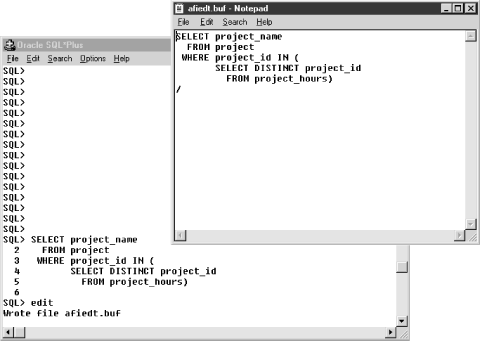- Sql Ed Wrote File Afiedt.buf Online
- Sql Ed Wrote File Afiedt.buf Free
- Sql Ed Wrote File Afiedt.buf Pdf
EDITSyntaxEDIT filename. Extwhere filename. Ext represents the file you wish to edit (typically a script).Invokes an operating system text editor on the contents of the specified file or on the contents of the buffer. The buffer has no command history list and does not record SQL.Plus commands.Enter EDIT with no filename to edit the contents of the SQL buffer with the operating system text editor.UsageIf you omit the file extension, SQL.Plus assumes the default command-file extension (normally SQL). For information on changing the default extension, see the SUFFIX variable of the SET command.If you specify a filename, SQL.Plus searches for the file in the directory set by ORACLEPATH. If SQL.Plus cannot find the file in ORACLEPATH, or if ORACLEPATH is not set, it searches for the file in the current working directory. If SQL.Plus cannot find the file in either directory, it creates a file with the specified name.The substitution variable, EDITOR, contains the name of the text editor invoked by EDIT.
Sql Ed Wrote File Afiedt.buf Online

Sql Ed Wrote File Afiedt.buf Free
You can change the text editor by changing the value of EDITOR. For information about changing the value of a substitution variable, see.
Sql Ed Wrote File Afiedt.buf Pdf
EDIT attempts to run the default operating system editor if EDITOR is undefined.EDIT places the contents of the SQL buffer in a file named AFIEDT.BUF by default (in your current working directory) and runs the text editor on the contents of the file. If the file AFIEDT.BUF already exists, it is overwritten with the contents of the buffer. You can change the default filename by using the SET EDITFILE command. For more information about setting a default filename for the EDIT command, see the EDITFILE variable of the SET command. Broken teeth the seeker zip download.